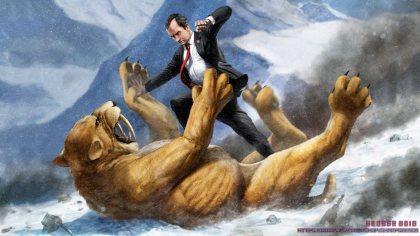I’ve just got back from a holiday and whilst I was gone it seems Sir David Attenborough has said something wrong. Again. In fairness to him (and with that voice of his he deserves the best treatment in the world) only one paragraph in his interview with the Radio Times was factually disagreeable. The rest is pretty good, excerpts of which (including his big mistake) can be found in this Guardian piece.
We stopped natural selection as soon as we started being able to rear 90-95% of our babies that are born. We are the only species to have put a halt to natural selection, of its own free will, as it were
To cut Sir David even more slack, this is an idea that seems superficially plausible. Unlike the time he was promoting that Aquatic Apes nonsense. After all, most of us no longer have to contend with the problems animals have to deal with. We’re not threatened by sabre tooth tigers, shivering because we aren’t well suited to the environment or fearful of disease. We have created an environment that has eliminated most “traditional” forms of natural selection.

I mean, it’s not like this is daily occurrence.
But to use this to suggest natural selection has ceased entirely is missing a big point: we’ve created a whole new environment. This is the premise of niche construction theory, which notes that whilst animals may isolate themselves from natural environments they often create whole new ones in the process that expose them to new selection pressures.
And our environment is certainly brand new. We’re living in cities of millions where we have to socialise to the extreme. Given living in large groups is likely one of the reasons our brains got so big there’s a strong chance that this new social development will also influence our brains.
Then there’s the fact that our success is now dependent on a whole host of behaviours which may have not been so important long ago. Jon Ronson‘s book The Psychopath Test notes how psychopaths are often very successful in business and politics. Might our new world, which places such importance on these institutions, start selecting for a more ruthless human?
The idea of humans continuing to evolve isn’t just speculation, we’ve actually discovered many examples of recent evolutionary change. Despite the fact we no longer have to fear sabre tooth tigers, we’re still evolving.
For example, during the last glacial maximum (colloquially known as “the ice age”) humans became short and stocky, a body plan that helps minimise heat loss. Now we’re out of the LGM we’re becoming tall and lanky again. Whilst some people might credit this change with improved diet, a large chunk of it is genetic. One study found that a minimum of 45% of the variance in human height is genetic. In other words, it’s heritable change over time; the very definition of evolution.
Other examples include our brain size, which has been decreasing over the past 10,000 years. Although the exact cause of this is unknown there are many possibilities. It may be linked to the ice age, with extra brain matter helping heat the head and keeping it all ticking along. Now we don’t need the extreme central heating we could cut down on the power bill (i.e. amount of food we have to consume) by reducing It may be that it’s becoming more efficient and doesn’t need so much raw power to achieve the same goal. And don’t get to downhearted about our smaller brains, IQs are still increasing.
These are just two ways in which we are continue to evolve, despite (or perhaps because of) the fact we’re living in our new, non-natural environments. Sir David Attenborough is simply wrong about the end of evolution. As biologists are fond of saying “evolution is smarter than you“.
I’ll end with a comment from the Guardian article, which summarises this issue better than I ever could.


